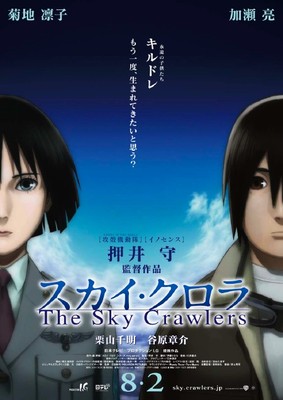
THE SKY CRAWLERS
Japan, 2008, 122 minutes, Colour.
Directed by Mamoru Oshii.
The Sky Crawlers is based on a Japanese novel but is set in a futuristic world. There is worldwide battle in the northern hemisphere, especially between two companies who are involved in armaments.
However, while this resembles the imagination of George Orwell and 1984, the technology is of both the future and of the past. The atmosphere of the film, especially with the pilots and their free time, is very much like the old World War Two films from Britain and the US in the 1940s and 50s. The planes themselves are creative, also a blend of the old, the present and the future.
The animation design of the film is a blend of realistic backgrounds, the countryside seen from the air, realistic buildings and room interiors, blended with animation vehicles, especially the planes. The characters are also quite stylised – with jerky, silent film-style movement, with rather inexpressive faces with slight drawing and characterisation.
The film is something of a boys’ own adventure type, especially with the battle sequences in the air. These also are reminiscent of the World War One battles with the Red Baron, the villain this time being The Teacher, a former employee and star pilot who has gone over to the other side.
The women in the film are very strong, a pilot, a maintenance worker and the commander-in-chief. The commander is a complex character and moves the film into the mystical and the mysterious – especially in her relationship with a pilot whom she has killed and who is transformed into a new pilot, the hero of the film. There is the challenge then of who is to kill whom because of passion, depression, hope for the future.
There is, however, the stereotype woman, the giddy woman who turns up at a diner as well as a prostitute in a brothel.
This is an animation film for adults, in the tradition of the anime and the manga, designed for an adult audience.
Interspersed throughout the film are some more existential reflections and conversations about the meaning of life, about the meaning of war, the central characters being children who are never allowed to grow up and whose attitude towards the war is quite cavalier – but, being challenged to think more deeply.
The film is very strong on smoking, as the Americans would say, what’s with all the lighting up, and the emphasis on cigarettes and the discussion about smoking?
1.The impact of the film? An animation film for adults? Men’s responses? Women’s responses? Japanese? Worldwide?
2.The animation style, the use of naturalistic backgrounds, the countryside, the buildings, the rooms? The contrast with the animation for the characters, their movements, expression and lack of expression?
3.The issue of language: the Japanese names and speaking in Japanese? Speaking in English? The English names, the signs, the bar? The TV commentary and the English accent? The tourists of the base and the English accents? The universal situation of the world?
4.The conflict in Europe: the newspapers, the headlines about Donegal? The two war companies, their being involved in warfare, battles in the air? Financial and economic situations?
5.The battles, the vivid animation, flight, fight, explosions? The maintenance of the planes?
6.The characters: the Kildren, never growing up? Yet their being pilots, relationships, sexuality? Smoking and drinking? The character of the young pilot, his new assignment, wanting to meet the previous pilot and take over the plane? The fellow pilots and their discussions? The air of mystery about his predecessor? Going to the commanding officer, her manner, refusing to talk? His sharing the room, going out to the diner, the women, the prostitute and the brothel? His trying to find out the truth? His going into action? The Teacher? The interactions with the commander, finding her daughter, talking with her? Her depression, her moods? Going out, drinking? The advances? The build-up to the flights, the dangers, the attack? The final discussions with the commander, his admiring her because she smoked? The guns, her wanting to kill herself? His shooting the window? The future?
7.The other pilots, the echoes of the camaraderie of the British and American films of World War Two?
8.The mechanic, her challenging about her gender? Her work, her support?
9.The local girls, the brothel, the stereotypes?
10.The battles, the invasion, the loss of life?
11.The attitude towards war, the Kildren? The discussions about war, its meaning? Having to take more responsibility?
12.The significance of the television commentaries, the man at the bar and his congratulations (and appearing Jewish)? The tourists and their jingoism? The hero and his having to look after the tourists and put on a smiling face for them?
13.The overall effect of the film, adventure, a future world, links with the past and the images and stereotypes of the past?